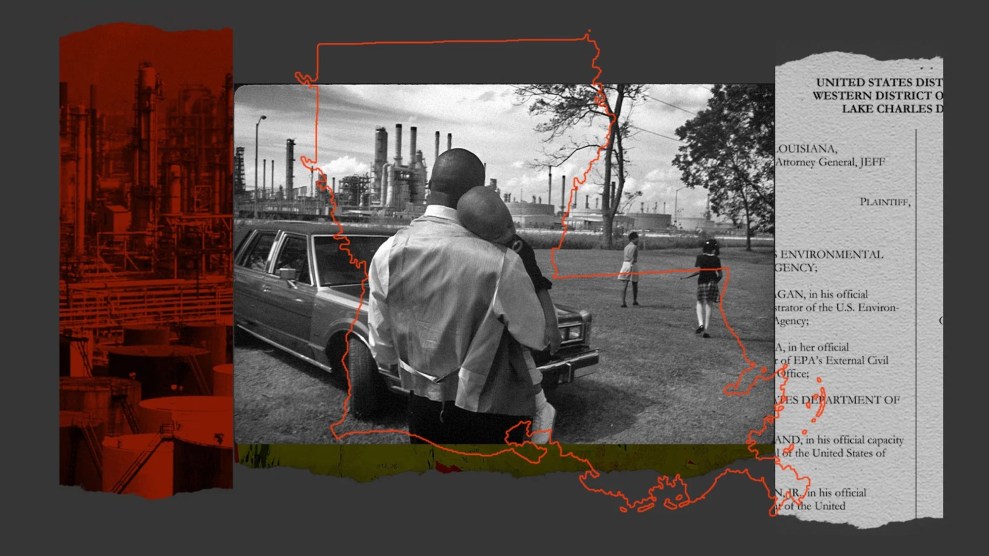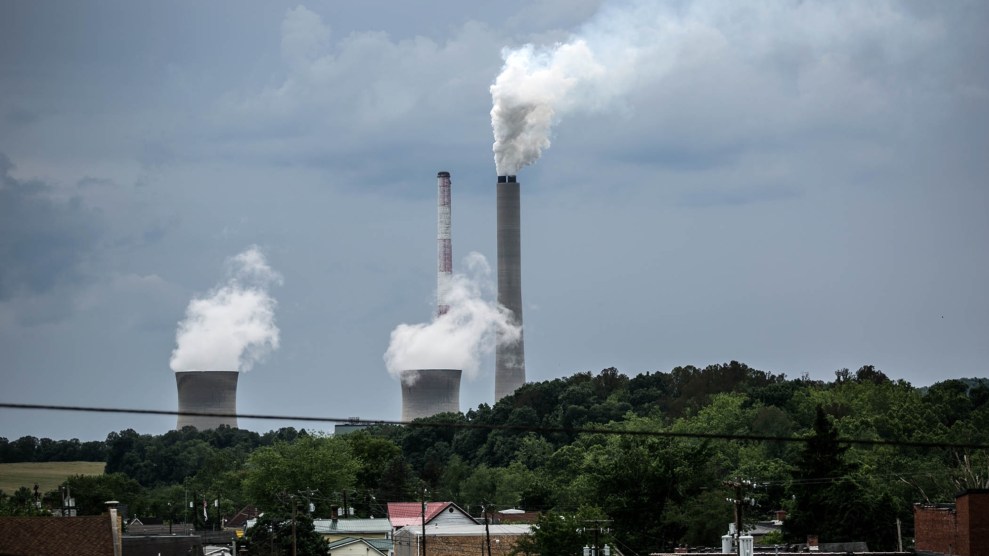
Grist/Andrew Lichtenstein/Corbis/Getty Images
This story was originally published by Grist and is reproduced here as part of the Climate Desk collaboration.
Pastor Philip Schmitter waited more than 20 years for the Environmental Protection Agency to do its job. In 1992, he’d filed a civil rights complaint to halt the construction of a power station that would spew toxic lead into the air of his predominantly Black community in Flint, Michigan. Decades passed without a response, so he joined four other groups around the country in a lawsuit to compel the agency to address their concerns.
The case hinged on the EPA’s duty to enforce Title VI, a provision of the landmark Civil Rights Act of 1964. Title VI allows federal agencies to take action against state policies that discriminate by disproportionately harming groups protected by the Act—the discriminatory policy being, in this case, Michigan’s permitting of a plant that would pollute Black neighborhoods. After the EPA lost the suit in 2020, agency officials finally began timely investigations of civil rights complaints and made some of the EPA’s first-ever findings of discrimination.
That progress, however, could be short-lived.
This week, the EPA abruptly terminated three of its highest-profile open civil rights complaints. The move deals a major blow not only to the majority-Black communities that filed them but also to the EPA’s own authority to enforce Title VI in places with some of the nation’s worst air quality. The cases originated in the region widely known as “Cancer Alley,” an 85-mile industrial corridor in southeast Louisiana, and were voluntarily closed after the state’s Republican attorney general sued the federal government for alleged abuses of power during the complaint negotiations.
Grist obtained copies of two draft agreements from the now-defunct negotiations, which reveal efforts by EPA officials to institute profound changes to Louisiana’s permitting process, which has historically concentrated chemical plants near Black communities. One of the most substantial terms of the resolution would have required state regulators to assess whether a community is already exposed to disproportionately high levels of pollution before permitting new plants there. With the cases closed, the prospect of those changes has all but vanished.
“This is basically the EPA not using the full power of its environmental laws,” said Adam Kron, a senior attorney at Earthjustice who worked on the case. He described Title VI as one of the clearest ways to advance environmental justice, a goal that Biden EPA has repeatedly called a priority. “It’s disappointing to see EPA acquiesce to what seems like a lawsuit that really doesn’t have much grounding to it.”
The Title VI statute states that no person should, on the basis of race, color, or national origin, be subject to discrimination under any program that receives federal funding. The provision is wide-reaching, covering hundreds of thousands of programs across the country and governing decisions as diverse as where a road can go or who can get treatment at a hospital. But in the environmental space, it’s been largely underutilized, with the EPA routinely failing to respond to dozens of cases within the 180-day period required by the law.
The 2020 federal court ruling on Schmitter’s case gave communities in Louisiana’s St. James and St. John the Baptist parishes hope that Title VI could finally help limit pollution in their backyards. Together, their complaints alleged a number of negligent actions by state regulators, including a failure to curb cancer-causing emissions that violate federal safety standards and to consider pre-existing pollution when permitting new industrial plants. A formal resolution of their cases would have likely addressed these concerns.
The draft agreements that Grist obtained include sweeping measures to change the way the state of Louisiana approves new industrial facilities, like folding community involvement into critical moments of the decision-making process and requiring officials to prove, both before and after plants begin operating, that their emissions will not disproportionately harm people of color. In Louisiana, majority-Black communities are exposed to at least 7 times the emissions, on average, as predominantly White communities in industrial areas.
“We were hoping to get systemic change,” said Kimberly Terrell, a research scientist at the Tulane Environmental Law Clinic, who worked on the complaints. “For decades, people have been fighting against individual polluters and individual facilities, but when the decision-making process itself is flawed, you need something that seeks to improve it.”
Louisiana officials did not respond to a request for comment.

Louisiana’s “Cancer Alley.”
Giles Clarke/Getty Images/Grist
Despite progress with the agreements, testimony in Louisiana’s legal filings suggests that, at some point during the negotiation process, things between state and federal officials began to sour. Then, in late May, the state’s attorney general, Jeff Landry, sued the EPA.
The case hinged on the EPA’s ability to pursue actions based on “disparate impacts,” or the idea that a policy or agency decision can disproportionately harm a specific group of people, regardless of whether or not that harm is intentional. These standards have always been unpopular with some state officials who view them as evidence of federal agencies meddling in matters beyond their authority. The Supreme Court’s conservative majority is sympathetic to these concerns, ruling in numerous landmark cases over the past few years to vastly restrict the powers of federal regulators.
But multiple lawyers that Grist interviewed argued that Louisiana’s legal arguments would have ultimately been unlikely to undermine Title VI, raising the question of why the EPA appears to have preemptively conceded on the matter. “It was unripe—there was no action by the EPA that Louisiana could challenge,” said Kron. “So it seems like a strange lawsuit for [the federal government] to take as a serious enough threat to just undo this whole process that’s been going on for over a year.”
Environmental advocates and residents in Louisiana also decried the decision to close the complaints. “I often feel like our communities are left to fight on our own,” said Joy Banner, an activist and long-time resident of the region. “It’s disappointing when we have organizations at the federal level who aren’t willing to step in to fight along with us for our basic human right to survive.”
EPA spokesperson Khanya Brann told Grist that the agency remains “fully committed” to improving the environmental conditions in the communities that filed the complaints. “Community participation has been critical to identifying both problems and solutions, and we look forward to our continued partnership with the residents in both parishes as we continue our joint efforts to improve public health and the environment,” she said.
The EPA wrote in its letters announcing the closure of the complaints that it would address residents’ concerns through other means, like its pending litigation against one of the region’s most infamous chemical plants and its proposed rules for tightening standards for certain types of facilities operating in the region. But residents told Grist that those measures do not cover the totality of their concerns, and that a major benefit of the Title VI process is its speedy timeline: While court cases can drag on and emissions standards can take years to implement, a resolution of the complaints may have granted communities much faster relief from toxic emissions.
Claire Glenn, a criminal defense attorney with a background in civil rights law, compared EPA’s use of Title VI to other federal agencies’ more robust implementation of the law. The Department of Transportation, for example, requires regulators to consider whether a project will disproportionately impact a group of people before it’s ever constructed. However, she added, deciding where a transit line goes is often less controversial than approving a multi-billion dollar company’s new industrial complex.
“I think the reason EPA’s Title VI program is so hamstrung is because it is so directly butting up against corporate interests,” she said.
Advocates told Grist that they are exploring other options to advance residents’ concerns, and called the EPA’s actions this week a setback but not a roadblock. Residents said that they are determined not to give up.
“We come from a long line of people who fought,” said Banner. “This is just one little hill that we have to overcome—but ultimately I see us heading to the mountain, and victory is the mountain.”













